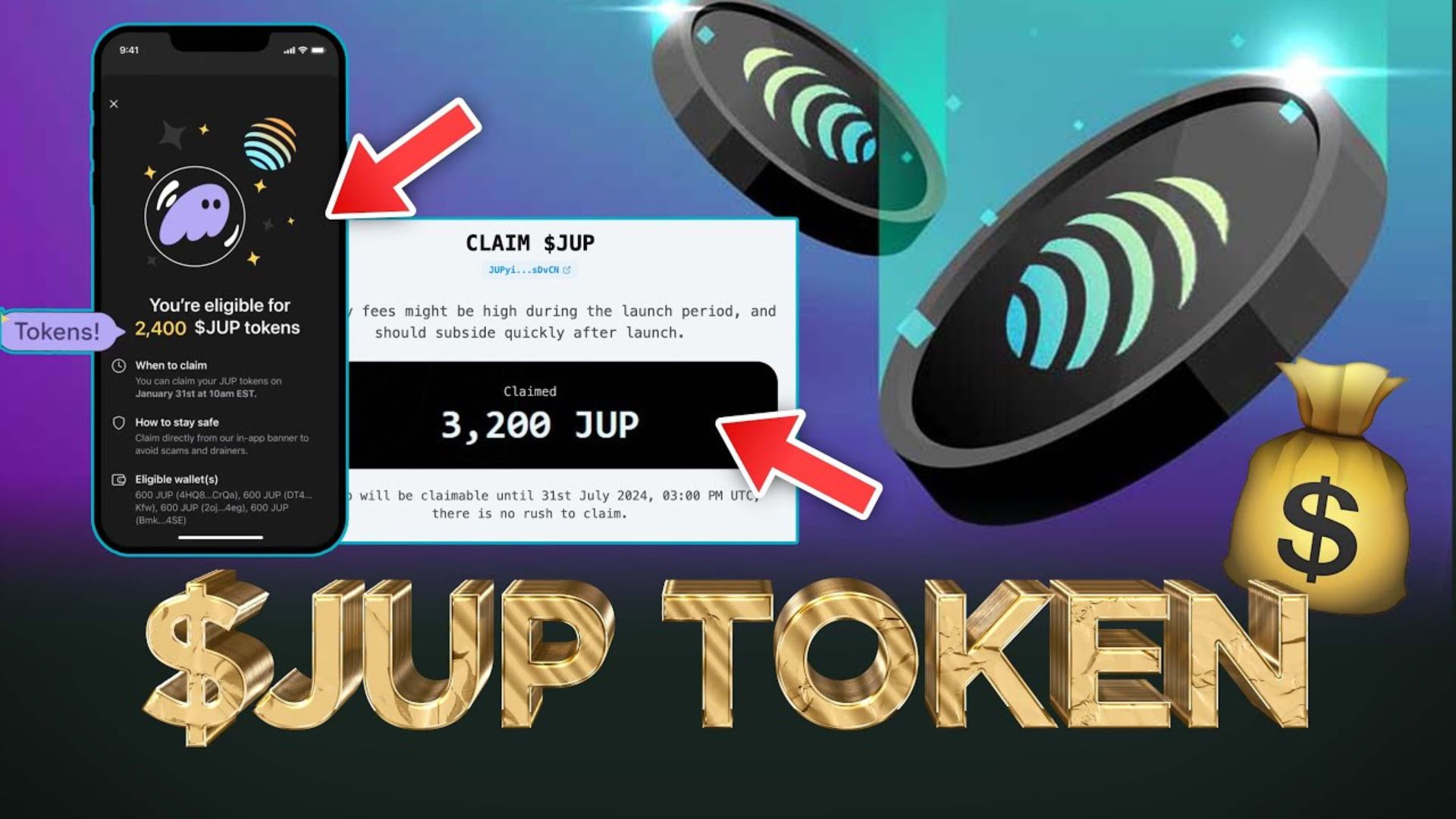What is Jupiter (JUP)? A Popular Decentralized Platform

What is Jupiter (JUP)? A Popular Decentralized Platform. Jupiter, a popular Decentralized Finance (DeFi) platform on the Solana blockchain, has lately become the world’s leading DEX aggregator. It has established itself as a significant liquidity aggregator, which entails pooling resources to provide more efficient and effective token swaps, perpetual futures, and the maintenance of decentralized stablecoins. The cryptocurrency community is excited about the anticipated JUP airdrop from the Jupiter project on January 31, 2024. This is a significant milestone for Jupiter and the Solana ecosystem since it offers to reward the platform’s early adopters and engaged users.
One billion JUP tokens will be issued in the first wave of this anticipated airdrop, aiming to reach a large base of almost 955,000 wallets that have interacted with Jupiter before November 2, 2023. Adding users who participated through interfaces like Sol-Incinerator and Solend broadens the reach of this endeavor. This massive airdrop recognizes and rewards early supporters and lays the groundwork for future rounds focusing on attracting new users and increasing liquidity inside Solana’s thriving ecosystem.
Understanding Jupiter (JUP)
In the DeFi space, Jupiter tackles a crucial problem: the need for effective and efficient liquidity aggregation for a range of financial products, including decentralized stablecoins, perpetual futures, and token swaps. Jupiter, one of the most widely used DeFi apps on the Solana blockchain, aims to maximize and simplify DeFi trade activities.
Jupiter’s primary job is to aggregate liquidity. This implies it pools resources from numerous sources to make token swaps run more smoothly and efficiently. Jupiter ensures that users receive the best possible asset pricing during trades by routing orders across different Solana-based exchanges. Jupiter originated as a platform that aimed to aggregate liquidity for token swaps, similar to Ethereum-based platforms. It has recently expanded its capabilities to include perpetual futures trading, increasing its breadth and utility in the DeFi ecosystem.
The platform’s governance is made possible via its native token, JUP, which allows community members to vote on crucial decisions and policies. This includes liquidity plans, token issuance, and ecosystem projects. The decentralized governance approach is consistent with the DeFi ideal of empowering users and stakeholders in the platform’s development.
How Does Jupiter Work?

Jupiter experienced a significant increase in trade volume and user engagement in 2023, largely thanks to Solana’s booming meme coin and airdrop market. Jupiter’s user-friendly design, dependable trading mechanism, and minimal fees have all played essential roles in its prominence. The platform’s emphasis on the Solana ecosystem and its strategic single-chain approach has solidified its position as a market leader in the DeFi space. Jupiter’s JUP token airdrop, slated for January 31, 2024, has risen in popularity.
The JUP token, which functions as a governance token, allows holders to vote on essential features of the platform, such as liquidity provision, future token emissions, and ecosystem activities. With an initial supply of 10 billion tokens and a sizable part set aside for community airdrops, the JUP token is prepared to play a critical role in the platform’s governance and future development.
How is Jupiter Unique?
Jupiter’s popularity has skyrocketed due to the forthcoming airdrop of 1 billion Jup tokens and the enormous trade volume around the WEN meme coin airdrop. Unlike traditional DEXs, an aggregator like Jupiter searches numerous exchanges for the best trade prices, giving users optimal trading possibilities and liquidity from multiple sources.
One of Jupiter’s most valuable features is its bridge comparator tool, which allows quick cross-chain transactions. This tool enables users to compare and select the most effective bridge for transferring tokens between blockchains and Solana, establishing Jupiter as a critical player in the cross-chain interoperability space. Its high trade volume and user base show Jupiter’s growing popularity. Thanks to its user-friendly layout and dependable trading mechanisms, it has quickly become a popular platform for Solana blockchain users.
What is the Jupiter Ecosystem?
The Jupiter Ecosystem on Solana is a dynamic and integrated network with a DEX aggregator core, cross-chain capabilities, the critical JUP token, a thriving community, and a solid connection to the Solana blockchain’s features and users. It represents a holistic approach to decentralized finance that prioritizes user experience, community governance, and platform expansion.
The Jupiter Ecosystem’s fundamental function is as a DEX aggregator on the Solana blockchain. Jupiter’s aggregator function allows it to pool liquidity from several decentralized exchanges. It provides users the best trading prices and deep liquidity pools across various tokens and trading pairs.
The Jupiter Ecosystem relies heavily on the JUP token. As a governance token, it allows community members to influence crucial platform decisions such as liquidity provisions, emission goals, and ecosystem activities. This decentralized governance concept is an integral part of Jupiter’s ecosystem. Jupiter’s success and usefulness are intimately related to the Solana blockchain. Solana’s advantages, such as minimal transaction fees and rapid throughput, have contributed to Jupiter’s growth, making it a popular platform for traders and liquidity providers.
What is the JUP Token?

The platform’s native token, JUP, is a governance token that allows community members to influence the platform’s direction and decisions. This involves approving liquidity and emission plans, authorizing token mints after genesis, and voting on ecosystem proposals. Jupiter’s token distribution strategy is notably community-focused, with a significant amount of JUP tokens reserved for airdrops to active users.
The first substantial airdrop targeted 955,000 wallets that engaged with Jupiter before a set deadline, making it one of the largest airdrops in history. Jupiter plans to issue 1 billion JUP tokens through an airdrop on January 31, 2024. This method rewards early and active users and seeks to decentralize ownership and control of the Jupiter platform, thereby increasing its desirability and stability as a platform for DApps and services.
- JUP functions primarily as a governance token. This means that JUP token holders can participate in decision-making to determine the Jupiter platform’s development and functioning. This includes voting on ideas about the platform’s functioning, improvements, and other crucial issues.
- The initial supply of JUP tokens is set at 10 billion. The release of these tokens is intended to benefit the ecosystem and involve the community. 40% of the initial supply is designated for community airdrops, with the remaining 40% retained for team and strategic development. The remaining 20% was initially set aside for token sales but was later moved to liquidity provision, community contributors, and grants.
- The JUP airdrop is an essential step in the token’s distribution strategy. The goal is to decentralize token ownership, reward early adopters and active users, and encourage new users to the network. The airdrop is divided into tiers to provide a broad and equitable distribution of tokens to participants at various degrees of engagement.
JUP Tokenomics
How to buy JUP with crypto
1. Log in to your Binance account or sign up to create one.
2. Go to the Deposit page.
3. In the Cryptocurrencies section, choose the crypto you plan to buy JUP with and generate a deposit address on the Exchange wallet.
4. Send the crypto to the generated deposit address.
5. Once the funds arrive in your wallet, you can trade them for JUP.





